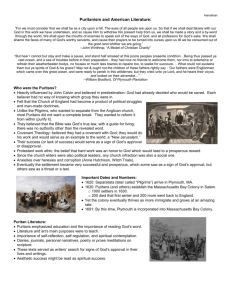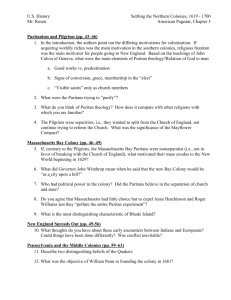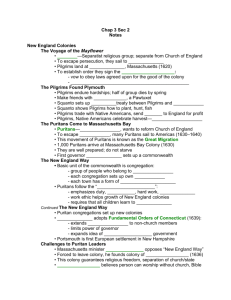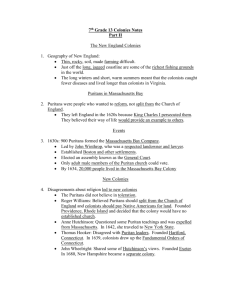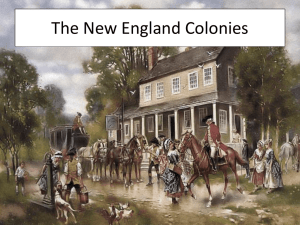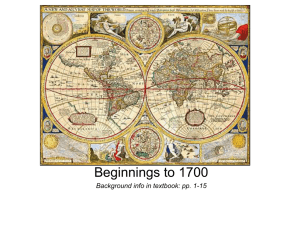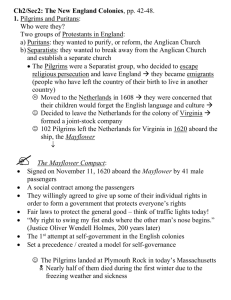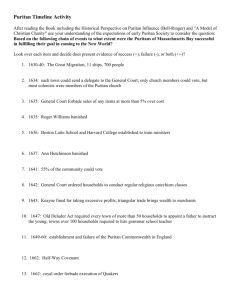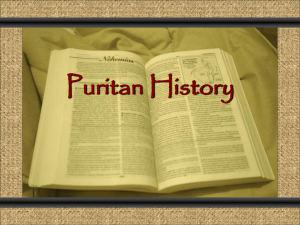Political, Economic, and Social Influences from the Puritans
advertisement
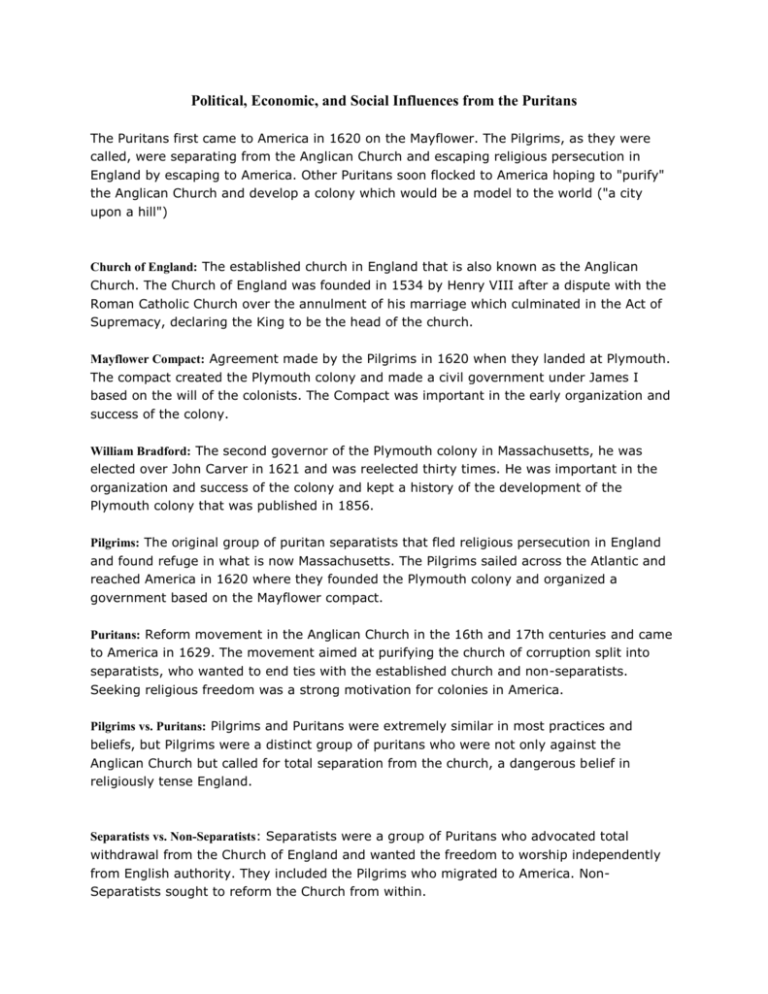
Political, Economic, and Social Influences from the Puritans The Puritans first came to America in 1620 on the Mayflower. The Pilgrims, as they were called, were separating from the Anglican Church and escaping religious persecution in England by escaping to America. Other Puritans soon flocked to America hoping to "purify" the Anglican Church and develop a colony which would be a model to the world ("a city upon a hill") Church of England: The established church in England that is also known as the Anglican Church. The Church of England was founded in 1534 by Henry VIII after a dispute with the Roman Catholic Church over the annulment of his marriage which culminated in the Act of Supremacy, declaring the King to be the head of the church. Mayflower Compact: Agreement made by the Pilgrims in 1620 when they landed at Plymouth. The compact created the Plymouth colony and made a civil government under James I based on the will of the colonists. The Compact was important in the early organization and success of the colony. William Bradford: The second governor of the Plymouth colony in Massachusetts, he was elected over John Carver in 1621 and was reelected thirty times. He was important in the organization and success of the colony and kept a history of the development of the Plymouth colony that was published in 1856. Pilgrims: The original group of puritan separatists that fled religious persecution in England and found refuge in what is now Massachusetts. The Pilgrims sailed across the Atlantic and reached America in 1620 where they founded the Plymouth colony and organized a government based on the Mayflower compact. Puritans: Reform movement in the Anglican Church in the 16th and 17th centuries and came to America in 1629. The movement aimed at purifying the church of corruption split into separatists, who wanted to end ties with the established church and non-separatists. Seeking religious freedom was a strong motivation for colonies in America. Pilgrims vs. Puritans: Pilgrims and Puritans were extremely similar in most practices and beliefs, but Pilgrims were a distinct group of puritans who were not only against the Anglican Church but called for total separation from the church, a dangerous belief in religiously tense England. Separatists vs. Non-Separatists: Separatists were a group of Puritans who advocated total withdrawal from the Church of England and wanted the freedom to worship independently from English authority. They included the Pilgrims who migrated to America. NonSeparatists sought to reform the Church from within. Massachusetts Bay Colony: Colony created by the Massachusetts Bay Company. Under the leadership of John Winthrop, the colony was created to provide the world with a model Christian society. The colony was created in 1630 and it was governed through a General Court selected by church members. City Upon a Hill: Name given to the Puritan society that was to be created in the New World. The leader of the Puritan migration, John Winthrop planned to create a utopian society based on Puritanism that would have no class distinction and would stress the importance of community and church. The society was to be an example to all the world of what could be achieved. It was anticipated that once the world saw this great city it would follow it example. John Winthrop: The first governor and one of the founders of the Massachusetts Bay Colony and a member of the Massachusetts Bay Company. He played a key role in the puritan migration and intended to create a utopian society in America. He was elected governor twelve times and pursued a conservative religious and governmental policy. New England Way: The Puritan dominance of New England and their desire to create a utopian society based on their doctrine created a distinct society in New England. Unlike other colonies, Puritans were guided by their religion and created a government and society tied to the church, a theocracy Covenant Theology: Christian Theology that stressed that an agreement was made by God with humans with the death of Jesus for the salvation of mankind. The theology differs from sect to sect, some assert that salvation is granted to all, some that it is earned and others that it can be achieved by faith alone. Congregationalism: Protestant organizational system based on the freedom of each church to control its affairs. An offshoot of the separatist, it was continued by the pilgrims in America where it was adopted by the new churches as a way to maintain local independence. Congregationalism was part of the strong independence of the colonies. Contrast Puritan Colonies with others: Because most colonies were created with financial or political gains in mind, puritan colonies had a special distinction from them. The puritans came to America seeking religious freedom and had a strong work ethic enabling them to achieve a success not seen in other colonies. Believed work bring them closer to god and feared living an idle life. Roger Williams, Rhode Island: Early colonial clergyman who founded the religiously tolerant colony of Rhode Island in 1636. Williams was banished from Massachusetts for his belief in religious freedom, he established a colony at Providence in 1636 that tolerated all dissenters and was in good relations with the Natives. Massachusetts School Law: Law also known as the Old Deluder Act of 1647 that replaced home education by creating a system in which small towns would have a person capable of teaching the children and every town of over one hundred homes would have a school. The law was a step towards creating a universal education system. Town meetings: The center of Colonial America political life especially in New England. Town Meetings were gatherings where all the voters in the town or nearby countryside would all congregate and go over issues that most interested them, such as town officers, and taxes for the following season. Voting Granted to Church Members: The New England puritans developed a more democratic system of government than in England that gave the power to elect the governor to all male saints. The idea was furthered in 1644 when it adopted a bicameral court with elected delegates. Puritan Ethic: Term that characterizes the strong sense of purpose and discipline that Puritans had. Part of the work ethic also resulted from a belief that wealth and success were a sign of saintliness and that idleness was a sin. This work ethic also helped the Puritans find success in the colonies and translated to an American colonial work ethic.
